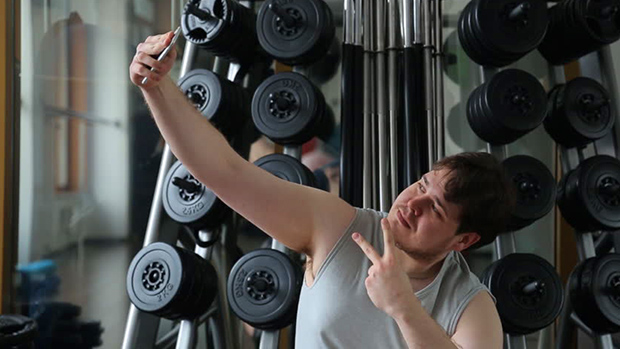Mind Games
The ball is snapped. The quarterback takes a few steps back and looks downfield. Nothing. Then the defensive line fails and about a 1000 pounds of muscled meanness barrels toward him. A receiver suddenly breaks into the open and the quarterback lifts his arm to throw...
Freeze.
At this moment, the amount of weight the quarterback can bench press doesn't matter much. His VO2 max just isn't that important. In fact, his body has become a secondary element in his eventual success or failure. Maybe he'll throw an interception. Maybe he'll choke under the pressure and get clobbered.
But notif he has trained with Dr. Jack Singer.
Dr. Jack Singer is an elite level Sports Psychologist. He's the secret weapon of many professional athletes and teams, teaching his clients how to consistently reach states of peak performance. When top level players or even weekend warriors want to get the edge, they go to Dr. Jack.
You've seen him on ESPN, Fox Sports and CNN, now it's time for T-Nation to pick his brain.
T-Nation: Dr. Singer, thanks for chatting with us today. Let's begin by talking about the field of Sports Psychology. Is there a difference between a Sports Psychologist and a shrink who just likes football and consults a few players?
Dr. Jack: That is a wonderful question to ask because there are so many psychologists who don't have formal or ongoing training in Sports Psychology, yet call themselves Sports Psychologists because they happen to work with athletes. I, for example, am a Certified Sports Psychologist and have a Diplomate in Sports Psychology from the National Institute of Sports... a recognition that's only granted to half of 1% of all of the psychologists who apply for such a Diplomate recognition.
T-Nation: What kind of athletes have you worked with over the years? What do they come to you for that needs fixing?
Dr. Jack: I've worked with athletes in virtually every sports endeavor, and with all levels of proficiency, from pros, to college athletes, to nationally ranked juniors, to weekend warriors. They come to me to help them function at peak efficiency, consistently. This may involve anger control, stress and anxiety elimination, mental toughness training, confidence and self-esteem building, rapid injury recovery and staying-in-the-zone training, as examples. I teach every athlete who wants that "unfair advantage" self hypnosis, but there are a multitude of techniques besides hypnosis that we cover.
Incidentally, I also work with teams, teaching them how to communicate with their coaches, how to quickly learn game plans, and how to stay positive regardless of the score.
T-Nation: Reading through some of your work, I see the topic of relaxation and its relationship with peak performance coming up often. When it comes to sports or just lifting weights in the gym, we often think of getting "amped up" or "psyched up." I've seen powerlifters slap each other in the face before a big lift. Where does being relaxed come in?
Dr. Jack: You know, there's a certain amount of getting "amped up" that's necessary for peak performance in all sports. That means that being "too relaxed" is really not the most efficient way to perform your best. The problem is learning the exact point where the "amping" or "psyching" becomes so stressful, that performance actually deteriorates.
So what's the answer? I help each of my athletes determine where that cutoff point is for them and then teach them relaxation routines to use as soon as their "amp level" approaches the point at which continued amping will deteriorate their performance. It's like a rheostat that they control themselves and keeps their performance sharp and consistent.
T-Nation: Very interesting. We all know when we're in "the zone" and when we're not. But can an athlete or an avid ironhead create the zone?
Dr. Jack: Anyone can be taught to create "the zone." It's a combination of imagery, visualization and hypnotic training. The secret, however, is to learn how to switch it on and stay in the zone, as needed.
In short, everyone is capable of creatingthe zone. Someone once said, "Whatever you conceive, you can believe, and whatever you believe, you can achieve." Conceiving that you want to get in the zone and learn how to stay there is the first step. I can teach you the rest.
T-Nation: I love the field of Sports Psychology because it deals not with beating the opposing team, but conquering one's own mental barriers and self-limiting thoughts. What are some common ways that people hold themselves back and become their own opponent?
Dr. Jack: Without a doubt, every athlete's number one opponent is their self-dialogue. You see, the specific messages that you give yourself during practice, just before competing, and during the competition all determine to a large extent your performance.
Self-limiting thoughts are all a result of unfortunate thinking habits and routines that people repeat over and over. As a Sports Psychologist, the very first thing I do is to help my clients recognize these self-limiting thoughts so that they can quickly switch them off and replace them with powerful, proactive, positive, performance enhancing thoughts. It really works!
T-Nation: Interesting. Can you give us an example of a top athlete with a specific problem and how you helped him or her overcome it?
Dr. Jack: Certainly. Of course, I can't relate the actual name or team because of confidentiality issues, but I can certainly share the problem, the treatment and the success.
This is a story about a football quarterback who was an All Star in high school. He was recruited by a major university, and after practicing with the team for two weeks, his coach referred him to me for mental toughness training. From day one, his "internal critic" started to work on him. He thought to himself about all of the other great quarterbacks on the team and how they were probably better than him... better prepared, stronger, etc. Even in practice, he was amazed at how his performance was so poor and then a coach referred him to me.
We set out to discover his internal dialogue and all of the sabotaging comments he was telling himself in his head. Once we discovered his negative thinking patterns, we devised a game plan to recognize and immediately change those thoughts, and his performance rapidly improved. The problem of his mental toughness issues was really a problem of poor self-talk habits, and once these were identified and reversed, his mental toughness and resultant performance skyrocketed!
T-Nation: I remember reading about Arnold the Governator using a mental trick in his early years. He didn't like leg training, so he purposefully walked around saying, "I love leg days!" Sure enough, he built a set of powerful legs. Was he on to something?
Dr. Jack: Absolutely! Think about the true case of a 97 pound older woman finding her husband trapped under the wheel of his car. She doesn't stop to think negatively; she only tells herself that she mustlift the car to free her husband... right now! And she accomplishes it!
Your subconscious mind takes all of its directions directly from you and it believes exactly what you tell it, making no judgments. Therefore, if you say to yourself (and therefore to your subconscious mind) "I hate leg training," then it will help you to avoid leg training, because it thinks that's what you want. On the other hand, if you say to yourself, "I love leg training," guess what? Just ask the Governator, or better yet, look at his legs!
T-Nation: On your website you write briefly about a rubber band trick used to counter these self-defeating thoughts. It's a great trick! Tell us about it.
Dr. Jack: Certainly. Get yourself a fat rubber band, like the ones that come in the mail. Once you recognize your negative thinking patterns (for example, saying to yourself "My opponent looks stronger than me"), snap that rubber band one or more times on your wrist to STOP THAT THOUGHT.
Once the thought is stopped in its tracks, take a series of deep breaths through your diaphragm and then replace the negative thought with a positive one, such as, "I have trained hard for this moment and my body is ready to prove to me how really strong it is. Let's just do it!"
This really works, but like everything else, it gets better with practice.
T-Nation: I'll have to try that when I see those damn pizza commercials. Bad thoughts there! Let's talk about hypnosis. I think most people still visualize a stage show where someone is made to cluck like a chicken. What's the real story of hypnosis?
Dr. Jack: You're right about many folks seeing a stage hypnotist and believing that if they're hypnotized, they'll wind up acting silly or being out of control. Understand that stage hypnotists are entertainers who carefully select volunteers who enjoy being on a stage and making people laugh. Therefore, the folks who wind up clucking like a chicken are actually exhibitionists who enjoy laughing and making others laugh and are completely susceptible to whatever the hypnotist asks.
Clinical Hypnosis is a whole different situation. First of all, no one can be hypnotized against their will or asked to do something which goes against their goals and best interests. It simply won't work. Ultimately, youare in total control in hypnosis, and it's a means of learning control.
Most of us have actually gone into spontaneous hypnosis hundreds of times during our lives. An example is when you're driving to your destination and get there without being aware of passing familiar streets or landmarks along the way...almost like you were driving on automatic pilot. Or, recall a beautiful spring day when you were in school, with your mind focused on something out the window and all of a sudden, your teacher startles you by calling your name. This "daydreaming" was a self-induced altered state of awareness called self-hypnosis.
We know that the mind is intricately connected to the body. There's a ton of research proving that through energy fields and electrical and chemical processes that every thought we have triggers an immediate response in every cell in the body, including, of course, the cells in our muscles. So, if our subconscious mind is filled with negative thoughts during our powerlifting contest, the muscles instantly weaken.
Through hypnosis, I infuse the subconscious minds of my athletes with powerful, positive suggestions, so that as they practice this, their muscles will actually work at peak efficiency during the event. This, of course, is just one of hundreds of examples I could share about the terrific power of hypnosis for athletic performance. I call it the athlete's "unfair advantage."
T-Nation: What about self-hypnosis? Can you teach us a quick technique?
Dr. Jack: Yes. Prior to a lifting experience, for example, just sit down on a mat and begin to breath slowly and deeply. When you're ready to go into self-hypnosis, make a tight fist with your dominant hand and that will serve as your cue to go into a brief hypnotic trance. Continue breathing slowly and deeply, perhaps visualizing your lungs taking in a full volume of healthy, clean oxygen and exhaling all of the tension out of your body. Breath in through your nose and out through your mouth.
Next, slowly count down from five to one, timing the count down with your exhales and when you get to one, visualize yourself lifting the weight you're about to attempt and lifting it with ease. Just picture in your mind the weights filled with feathers instead of iron, and see yourself lifting the weight easily as you tell yourself, "I know I can do this. I WILL do this."
Do this visualization as long as you wish and then calmly go and do your lift. When you are through, relax and tell yourself that it's time to come out of your self-hypnotic trance. Then, count backwards from five to one. When you get to one, you'll be back to your fully aware and alert stage, feeling wonderful, calm, energized and a new power! Have fun with this, and remember, practice, practice, practice.
T-Nation: Cool. I'll try that. You've written a lot about burnout in athletes, even very young athletes. What about the bodybuilder or average gym member? I don't recall the stats offhand, but the fact is that most people quit training after a while or at least become very inconsistent. Where do we burn out?
Dr. Jack: Burnout is caused by allowing the stresses involved in your sport to become larger than the pleasures. Since all stress is caused by the negative, self-defeating internal dialogue that we engage in, then we can overcome and, in fact, avoid stress by harnessing those negative thoughts in the first place and replacing them with positive affirmations.
Practicing this will ultimately eliminate overwhelming stress and thus eliminate burnout. You all deserve to feel powerful, empowered and proud of yourself. With the proven techniques of Sports Psychology, you can all accomplish this...whether you're a body builder, a powerlifter, a fitness enthusiast or a weekend warrior. These techniques really work!
T-Nation: In recreational bodybuilding, I see a lot of people getting discouraged and defeated because they compare themselves to others. The bodybuilding mags are full of genetic gods on steroids, so it's easy for the average guy to get discouraged. Oddly, the same guy doesn't get discouraged when he can't slam dunk like an NBA pro. He still likes shooting hoops. But many quit lifting weights if they don't look like magazine cover models in four weeks. How would a Sports Psychologist tackle this issue?
Dr. Jack: This is another internal dialogue/internal critic issue. So many of us compare ourselves to the best and the brightest celebrities and because we don't match up in a particular feature or two, we put ourselves down, feel helpless and hopeless, and give up on a goal.
We all need to realize that perfection is never naturally attained, set realistic goals for ourselves and strive to accomplish those goals. Just like we can't change our nose structure without artificial makeover surgery, we can't change our physical genetics...but what we can do is absolutely work our bodies, build them, and develop the very best that's possible for our genetically predisposed frames.
In addition, new advances in self hypnosis actually dramatically aid muscle development, so that the body limitations you perhaps have always believed about yourself may not really be valid at all!
T-Nation: Now that's interesting! You may have to write us an article on that topic! Thanks for the talk today. Where can T-Nation readers go to find out more about you and your services?
Dr. Jack: This talk has been a real treat for me and I hope to be an ongoing resource for your readers. To learn more about my phone and in-person consultations, please contact me at (949) 481-5660. It will be my pleasure to help you skyrocket your athletic success!
To inquire about me speaking for your company, convention or association, please learn about my professional speaking services by visiting my web site at: www.funspeaker.com or contacting me at the same number as above.
T-Nation: Cool. Thanks again!



